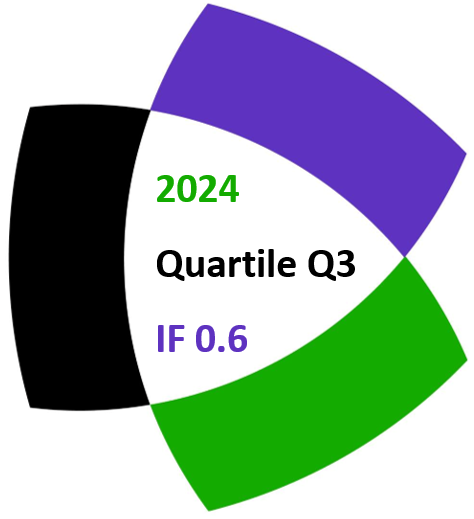Eiji Miyanohara
Notes on Number Theory and Discrete Mathematics
Print ISSN 1310–5132, Online ISSN 2367–8275
Volume 29, 2023, Number 1, Pages 48–61
DOI: 10.7546/nntdm.2023.29.1.48-61
Full paper (PDF, 264 Kb)
Details
Authors and affiliations
Abstract
Let ![]() and
and ![]() be two multiplicatively independent positive integers and
be two multiplicatively independent positive integers and ![]() be an integer with
be an integer with ![]() . Let
. Let ![]() be a finite set of integers. Nishioka proved that for any algebraic number
be a finite set of integers. Nishioka proved that for any algebraic number ![]() with
with ![]() the infinite products
the infinite products ![]() (
(![]() ) are algebraically independent over
) are algebraically independent over ![]() . As her result, for example, the transcendence of
. As her result, for example, the transcendence of ![]() is deduced. On the other hand, Tachiya, Amou–Väänänen investigated the certain infinite products which satisfy infinite chains of Mahler functional equation. The special case of the result of Tachiya shows that the infinite product
is deduced. On the other hand, Tachiya, Amou–Väänänen investigated the certain infinite products which satisfy infinite chains of Mahler functional equation. The special case of the result of Tachiya shows that the infinite product ![]() with
with ![]() (
(![]() ) is either rational or transcendental.
) is either rational or transcendental.
In this paper, we prove that the infinite product ![]() with
with ![]()
![]() is either rational or transcendental. Moreover, we give sufficient conditions that
is either rational or transcendental. Moreover, we give sufficient conditions that ![]() is transcendental.
is transcendental.
Keywords
- Infinite product
- Transcendence
- Infinite chains of Mahler functional equations
2020 Mathematics Subject Classification
- 11J91
- 11J87
References
- Allouche, J.-P., & Shallit, J. (2003). Automatic sequences: Theory, Applications,
Generalizations. Cambridge University Press. - Amou, M., & Väänänen, M. (2015). Arithmetical properties of certain infinite products. Journal of Number Theory, 153, 283–303.
- Amou, M., & Väänänen, K. (2017). On algebraic independence of a class of infinite products. Journal of Number Theory, 172, 114–132.
- Bell, J. P., Bugeaud, Y., & Coons, M. (2015). Diophantine approximation of Mahler numbers. Proceedings of the London Mathematical Society, (3) 110, 1157–1206.
- Bugeaud, Y. (2012). Distribution modulo one and Diophantine approximation. Cambridge Tracts in Mathematics, Vol. 193. Cambridge University Press.
- Coons, M., & Spiegelhofer, L. (2018). Number Theoretic Aspects of Regular Sequences. In V. Berthé, & M. Rigo (Eds.), Sequences, Groups, and Number Theory, Trends in Mathematics Series, Springer, pp. 37–87.
- Delange, H. (1972). Sur les fonctions q-additives ou q-multiplicatives. Acta Arithmetica, 21, 285–298.
- Duverney, D., & Nishioka, K. (2003). An inductive method for proving the transcendence of certain series. Acta Arithmetica, 110(4), 305–330.
- Gel’fond, A. O. (1968). Sur les nombres qui ont des propriétés additives et multiplicatives données. Acta Arithmetica, 13, 259–265.
- Masser, D. (2016). Auxiliary Polynomials in Number Theory. Cambridge Tracts in Mathematics Book 207.
- Nishioka, K. (1994). Algebraic independence by Mahler’s method and S-unit equations. Compositio Mathematica, 92, 87–110.
- Nishioka, K. (1996). Mahler Functions and Transcendence. Lecture Notes in Mathematics, Vol. 1631 Springer.
- Tachiya, Y. (2007). Transcendence of certain infinite products. Journal of Number Theory, 125(1), 182–200.
- Uchida, Y. (1999). On p and q-additive functions. Tokyo Journal of Mathematics, 22(1), 83–97.
Manuscript history
- Received: 10 August 2022
- Revised: 3 January 2023
- Accepted: 15 February 2023
- Online First: 18 February 2023
Copyright information
![]() Ⓒ 2023 by the Author.
Ⓒ 2023 by the Author.
This is an Open Access paper distributed under the terms and conditions of the Creative Commons Attribution 4.0 International License (CC BY 4.0).
Related papers
Cite this paper
Miyanohara, E. (2023). Transcendental properties of the certain mix infinite products. Notes on Number Theory and Discrete Mathematics, 29(1), 48-61, DOI: 10.7546/nntdm.2023.29.1.48-61.


